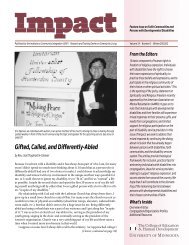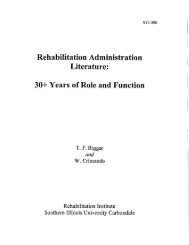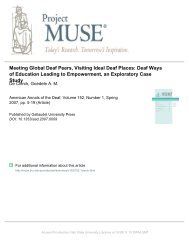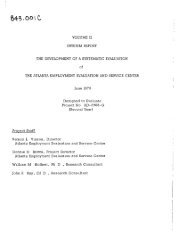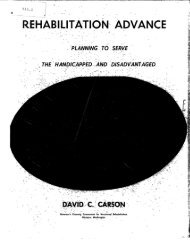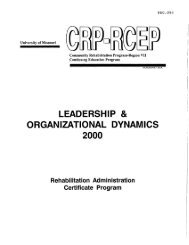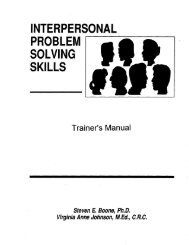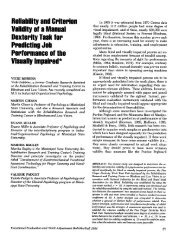by requirements for the degree of (Education) - NCRTM
by requirements for the degree of (Education) - NCRTM
by requirements for the degree of (Education) - NCRTM
Create successful ePaper yourself
Turn your PDF publications into a flip-book with our unique Google optimized e-Paper software.
understanding and acceptance <strong>of</strong> <strong>the</strong> mentally retarded and have been influ-<br />
ential in helping to establish sheltered workshops, rehabilitation facili-<br />
ties, special school classes, and recreational facilities <strong>for</strong> <strong>the</strong> mentally<br />
retarded.<br />
In 1961 national attention was focused on <strong>the</strong> overall problem when<br />
President Kennedy appointed <strong>the</strong> President's Panel on Mental Retardation<br />
and commissioned its members to develop a national coordinated pr.ogram <strong>of</strong><br />
research and services to combat mental retardation. A thorough study <strong>of</strong><br />
causes, prevention, and treatment resulted in comprehensive plans to lessen<br />
<strong>the</strong> problems associated with retardation. Emphasis was placed on assimilat-<br />
ing and coordinating <strong>the</strong> knowledge skills, and experience <strong>of</strong> many disci-<br />
plines to deal with <strong>the</strong> problem.<br />
From <strong>the</strong> start, education and vocational rehabilitation had signifi-<br />
cant roles to play. Traditionally, <strong>the</strong>y uphold <strong>the</strong> philosophy that every<br />
member <strong>of</strong> a democratic society, including <strong>the</strong> disabled, has <strong>the</strong> right to<br />
a secure and satisfying life, and that society is obligated to provide<br />
<strong>the</strong> necessary special services to equalize <strong>the</strong> opportunities <strong>of</strong> <strong>the</strong> dis-<br />
abled as compared to <strong>the</strong> non'disabled members <strong>of</strong> society. The goal <strong>for</strong><br />
<strong>the</strong> mentally retarded was apparent: to provide education and training from<br />
early childhood through adulthood to assist <strong>the</strong> individual in reaching his<br />
highest and most satisfying level <strong>of</strong> functioning in <strong>the</strong> personal, social,<br />
and vocational spheres. If <strong>the</strong> nation's mentally retarded are to be econom-<br />
ically productive, appropriate habilitation services must be <strong>of</strong>fered as part<br />
<strong>of</strong> <strong>the</strong> total educational pr.ogram. As recommended <strong>by</strong> <strong>the</strong> President's 1962<br />
Panel on Mental Retardation, <strong>the</strong>se services must inclde provisions <strong>for</strong>:<br />
a) Vocational evaluation, counseling and job placement<br />
b) Training courses in appropriate vocational areas



